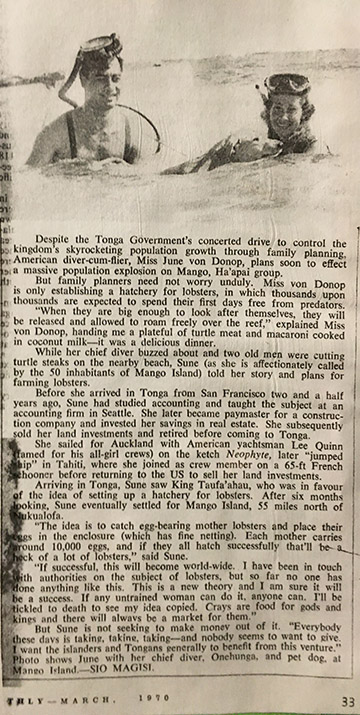Revisiting “A Farm in the South Pacific Sea”
“A Farm in the South Pacific Sea” is the title of a book about an enterprising but restless Seattle woman who wanted to do something of value in her life. She’d married and divorced young, remarried twice and never had children. She owned an apartment building in Seattle, financed by her freelance bookkeeping career. She learned to scuba dive, took a long vacation on O`ahu, where she could dive without a full body suit, and dove often with a local group. During a dive, she witnessed a spiny lobster extruding eggs and wondered if they could be hatched in an enclosure and grown to harvest size, much as shrimp were being farmed on the island.
A story was born. She researched spiny lobster habitat and searched for a country that might allow her to enclose an area in the sea to establish a farm. The Kingdom of Tonga, a British protectorate at the time of her search in the 1960s, invited her to visit with the possibility of agreeing to such an endeavor.
June arrived in Tonga in 1967, a few weeks before the coronation of King Taufa`ahau Tupou IV. She conducted a search of the Ha`apai Islands with his blessing and was granted the right to enclose an area of the sea on Mango Island. The islanders constructed a palm frond fale (house) for her near their island village. June hired a Tongan woman as her “housegirl” on the island. Island women helped her furnish her home while men helped her construct an enclosure in the sea and search for female spiny lobster to nurture through egg hatching.
June paid the Mango Island workers’ salaries from the special fund she had set aside for that purpose. That island’s 50 or so residents welcomed her contribution to their economy and to their personal lives. Three girl babies born during her stay were named for her, though there is no “J” in the Tongan alphabet. Those islanders learned called her Soo`nay while learner to pronounce her name as we know it in English. She referred to her name sakes as “Junies, followed by numbers one, two and three, but she remembered them in her will by their full Tongan names.
On January 14, 2022 the Tonga-Hunga-Ha`apai volcano erupted, setting off a tsunami that swept away the Mango Island village and left only ash covered trees.
My heart is heavy, burdened by sorrow and intermittent news. I knew some Tongan people from June’s stories that I rewrote as fiction based on fact. June left Tonga in 1971. Her experimental nursery had been destroyed by Cyclone Dolly in 1970. She left behind a complete report of her work for their future endeavors and a part of her hearaat.
Author’s Note: An updated version of A FARM IN THE SOUTH PACIFIC SEA will be released in 2022.


